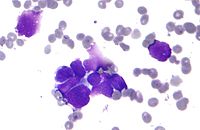
Photo from wikipedia
633 Background: Patients with metastatic renal cell carcinoma (mRCC) involving the pancreas have been shown to exhibit a relatively indolent course, yet the biologic explanation is unclear. We sought to… Click to show full abstract
633 Background: Patients with metastatic renal cell carcinoma (mRCC) involving the pancreas have been shown to exhibit a relatively indolent course, yet the biologic explanation is unclear. We sought to characterize the genomic landscape of patients with mRCC harboring pancreatic metastases to identify molecular drivers of pancreatic tropism. Methods: mRCC patients harboring pancreatic metastases from UTSW and Cleveland Clinic were identified. Clinicopathologic data and oncologic outcomes were analyzed. Samples were obtained from primary tumors, metastatic sites (including pancreatic or other distant metastases), and matched normal tissue. Whole exome (WES) and RNA sequencing of tumors was conducted. Patient-derived xenograft (PDX) models were generated from a subset of patients, and the engrafted tumors were analyzed. Results: 31 mRCC patients with pancreatic metastases were included with 54 tumor samples derived from the primary tumor or thrombus (24), pancreatic metastasis (21), or other metastatic sites (9). Median follow-up was 101 months. Clinicopathologic characteristics were similar between the two institutional cohorts, and all but one patient were favorable or intermediate IMDC risk. All patients had clear cell histology. 8 patients (26%) were metastatic at diagnosis, and median time to metastasis in the remaining patients was 74 months (IQR 32-120). Overall (OS) and cancer-specific (CSS) survival did not vary by IMDC risk group. Morphologically, tumors largely displayed low-grade acinar patterns. WES with matched normal tissue and RNAseq were completed with adequate quality for 48 and 30 samples, respectively. 14 PDX lines were generated, of which 5 (36%) engrafted stably (≥2 passages). WES from 2 tumorgraft specimens revealed preservation of specific mutations in the corresponding human samples. Conclusions: mRCC patients with pancreatic metastases exhibit remarkably favorable survival outcomes. The relatively indolent biology of these tumors is reflected histologically and genomically and can be recapitulated in PDX models. Understanding tumor heterogeneity may help refine prognostic models for mRCC and hold implications for improved personalization of therapy.
Journal Title: Journal of Clinical Oncology
Year Published: 2019
Link to full text (if available)
Share on Social Media: Sign Up to like & get
recommendations!